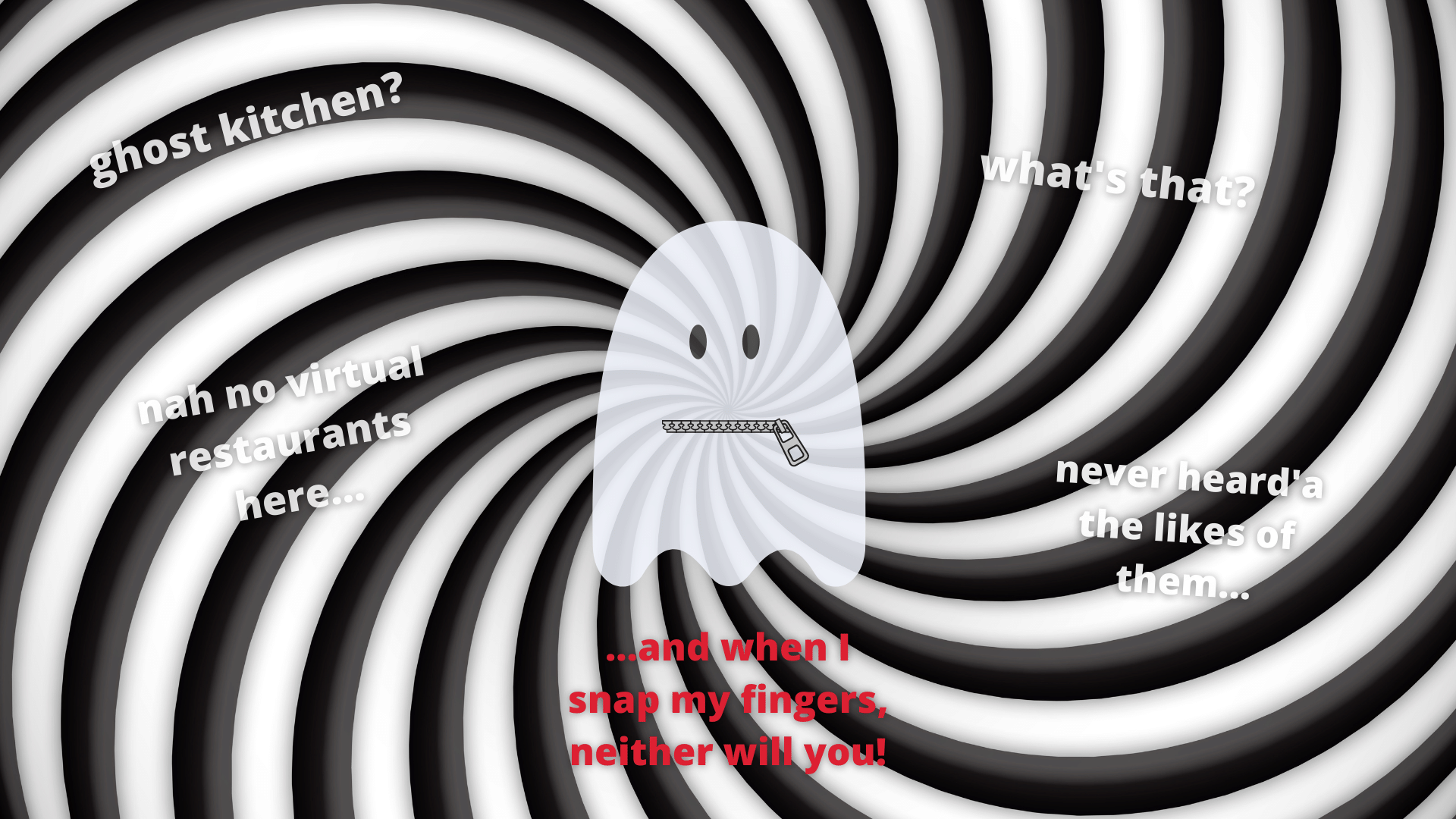"Queso Dealer" | spooky kitchens #25
July 2nd, 2022. The state of virtual restaurant transparency, Butler's demise, Friday's sushi, REEF is MoviePass.
Happy Friday y’all,
First thing’s first: don’t get food poisoning, it’ll make your newsletters late. Also, it sucks.
Also FYI, you can read this on the web, with slightly better aesthetics than your inbox.
And just a quick reminder: all green text is linked.* (*not always to anything important)
So what happened this week? (TL;DR)
First, on the state of virtual restaurant transparency.
Also, the ghost kitchen for hotel crossed to the Great Beyond, Fridays loves that good C3 sushi, and the Middle East’s super-app gobbled up a regional food deliverer.
Now fire ghost kitchen-ish concepts!
Virtual restaurants’ lack of health oversight is both a restaurant and a city problem (“Do you know where your chicken wings come from? Explosion of virtual restaurants fuels health concerns” Kay Lazar & Anissa Gardizy, Boston Globe).
It goes almost without saying (but I’m going to say it anyway) that it’s hard for the health department to monitor a restaurant’s safety when they don’t know a restaurant exists. We’re still in the Wild West of virtual restaurants, and the lack of almost any government oversight adds to their appeal; they’re easy to spin up, and easy to close down. Health departments in all but a couple major cities are ill-equipped to handle new restaurants that can rapidly proliferate with hardly a blip in the real world, which does pose a public danger, regardless of most restaurateur’s assertions that a virtual brand is akin to a menu change. And in many cases, it may be a simple branding extension or as easy as adding a few new ingredients to the kitchen that are still in host restaurant’s wheelhouse; but where that’s not the case, where a restaurants adds a virtual brand (or five) with a menu they have no business throwing into their kitchen, that’s the danger zone.
But this status quo — of restaurants adding virtual restaurants without local officials’ awareness — poses potential problems for both parties. In a state of zero regulation, any new regulation is likely to be perceived as a threat to business owners on a local and eventually national basis. Those owners will, at the first murmurs of regulation, circle their silly little wagons and bark about free enterprise and how they’re the professionals and all’s been well so far. City officials, understandably concerned for widespread health risk from invisible businesses, will respond poorly to pushback; and regulations may end up being harsher, or less sensical, than they’d be if the two parties had any degree of communication ahead of time.
What I’m saying is, before these two groups inevitably clash and erupt in a scattering of regulations that probably overreach and make little sense (while still being fundamentally necessary) – restaurants and health officials should get ahead of the game. Health officials should ask questions rather than find ways to fine restaurants on the spot for “being sneaky.” And restaurants should be open to their local health departments (with whom they should have a good relationship anyway; never trust a restaurant that doesn’t trust the health dept) about other brands that they operate; not just when inspections come through, but when you add the brand. Because waiting until you’re asked about it (as Robert Earl proposes) is inherently sneaky. Sneaky by omission. Basically, if you’re going to run a virtual brand (or twelve), chin up and face the music.
Oh, and the customers? Will never know the difference. If you’re out there ordering Another Wing or Mariah’s Cookies, you don’t give a shit who’s making your little stamped bag of stunningly mediocre food one way or the other.
💀 Butler’s brief run ends (“Hotel ghost kitchen company Butler Hospitality quietly dissolved in May” Aneurnin Canham-Clyde, Restaurant Dive). A niche market is a double-edged sword. Butler’s attempt to ghost-ify hotel food was a noble gambit, but feel upon the sharp edge nonetheless. Hotel food remains an unanswered macro question with occasional micro answers. For some hotels, I’m sure Butler’s system worked; but not enough. For other hotels, good old fashioned room service still kicks. For still others, ground-floor hotel restaurants handle things just fine. But where once room service was a given, there’s no one-size-fits-all solution to hotel food, nor even a one-size-fits-many. Which I love. Because that leaves open the excitement of someone “figuring it out,” or the pleasant small competition of a market that demands not to be figured out.
✌️ Cloud enters two Midwest metropoles (“Run by former Uber CEO, ghost kitchen with dozens of spaces opens in downtown Indianapolis” IndyStar & “Downtown Milwaukee’s new ghost kitchen Paper Table Food Co has landed a Wingstop. It’s opening Sept. 15” Tom Daykin, Milwaukee Journal Sentinel). Indianapolis’s “Circle City Eats” and Milwaukee’s “Paper Table Food Co” are both open today. As per usual, details are scarce on the two new Cloud operations (Paper Table Food Co is owned and operated by one of Cloud’s various CIA-esque shells, KDM Holdings) – but as with many other Cloud sites, the restaurants are predominantly local operators jumping in on a cheap new solution (and I can’t blame them). Wingstop is notable for the brand name – but is also a company that’s made a highly-lucrative business out of being able to open their doors practically anywhere, chiefly in medium or small footprints and in multiple ghost kitchens. Ultimately, there’s little else new here for Cloud – what’s surprising to me is how little the company has changed in my years following this rollercoaster industry.
🎏 God I love going to TGI Friday’s for…sushi… :( (“TGI Friday’s CEO Ray Blanchette on finding success with a virtual sushi brand” Joanna Fantozzi, NRN). As straight-up weird as it would be to eat sushi in a Fridays – so weird – people appear to dig it. In fact, plenty of people. Lots! Enough to open C3’s Krispy Rice (the virtual brand partnered with Fridays) up for dine-in at some Friday’s locations. Enough to generate a $100M incremental revenue opportunity, according to Mr. Blanchette (CEO). The success has inspired the two restaurants connected through TriArtisan to try another Asian fusion concept: Kumi Tacos.
The idea of someone loving the Friday’s vibe so much that they want to eat there also try something totally new is…unfathomable. But again, I don’t have to fathom it. $100M fathoms it plenty.
🤔 A funky (but big) acquisition in the Middle East (“Careem acquires food delivery platform Munch:On in the UAE” Gulf Business). Careem is more or less to the Middle East what WeChat is to China (and what Uber wants to be, but never will be, to the US): a regional super-app. Its latest acquisition is Munch:On, a subscription-based food deliverer with millions of customers. The big guy gobbling up the slightly smaller guy; pretty standard stuff. Except that Careem is shutting down Munch:On’s daily operations while they rebuild the app within Careem – and unless that process happens faster than any app development has ever happened, it’s a questionable choice. Why put the brakes on Munch:On and leave a potentially wide revenue gap in the time between its closing and re-opening in Careem? Not to mention peeving Munch:On’s entire, semi-dependent user base (more than they probably already are). It feels like a bit of a desperate move, declaring that Munch:On’s customers are either in Careem, or they’re no longer customers at all. Compare this to Caviar and Postmates, acquired by DoorDash and Uber Eats, respectively, while still remaining their own apps (Caviar jumped to DoorDash’s operating system some time ago, but it’s still Caviar). Surely there’s a good reason; I just don’t see it.
🍿 REEF is the new MoviePass (“On the Border Announces Partnership with REEF Kitchens” Press Release, FSR Magazine). I no longer begrudge restaurants (...too much) for their partnerships with REEF. Because to me, it’s a lot like MoviePass; probably a deal that is too good to be true for very long, so you might as well get in while it’s here. Eventually, the party will end; the model will (the model must) change, or the company behind it will, or both. But in the meantime, sure. Get your 300 ghost locations. Boost those growth stats. Give REEF the liability for success. Why not?
☹️ Restaurants really suck at naming restaurants, huh? (“Qdoba launches first virtual brand” Julie Littman, Restaurant Dive). “Pure Gold” is simultaneously Qdoba’s first virtual concept and yet another entry into the annals of “Half-Assed Virtual Restaurant Names” (though at least this one isn’t offensive). Why is it that restaurants (and virtual brand purveyors) are so bad at naming their virtual brands? Regular restaurant names are typically fine, with notable exceptions (*cough cough* Twin Peaks); so what, exactly, is the difference? Is it that they’re trying too hard to make it sound cool for the delivery-ordering Zoomers but only wind up with foodie-variations on “How do you do, fellow kids”? Is it because they give as little thought & energy to the name as they do every other aspect of launching a virtual brand? Or is it because this is, actually, the full extent of Big Restaurant marketing capabilities (a sad prospect)?
On the spectrum of virtual brand names, ultimately, “Pure Gold” isn’t the worst. But I’d skip it in the DoorDash marketplace in a heartbeat (if I even noticed it in the first place). And you may be thinking, “Hey, dingus, if it’s so easy to do better why don’t you come up with a spicy virtual brand name for a queso-based restaurant?” And to that I say… “Queso Dealer.” Get it? Like quesadill-
💸 Dessert: Can’t make this stuff up. "Inside the crypto restaurant after the crypto crash. In which the most famous NFT restaurant stops accepting crypto payments. It’s just too delicious. (Note: owner Andy Nguyen later said on Twitter that this was “fake news”...but declined in the first place to speak to the LA Times for the original article. You know what I always say: there’s no more trustworthy person than one who uses the phrase “fake news!”)
That’s spooky kitchens.
Boo ✌️,
Mitch
P.S. If you’re just jumping into ghost kitchens and want to learn more, check out my ghostly glossary and spooky kitchens ghost kitchen cheat sheet. They’re there to help make sense of this weird and wild west.



